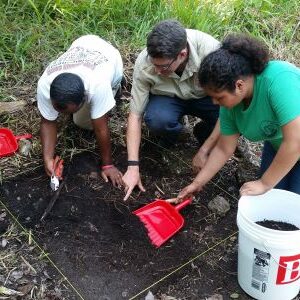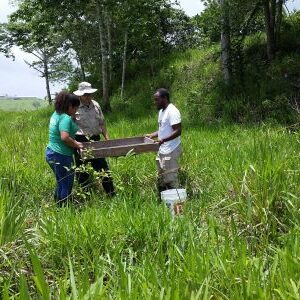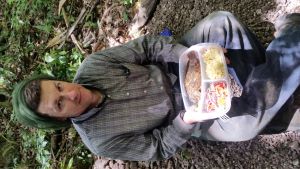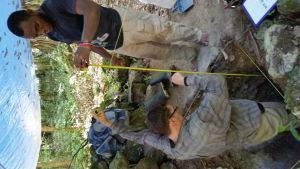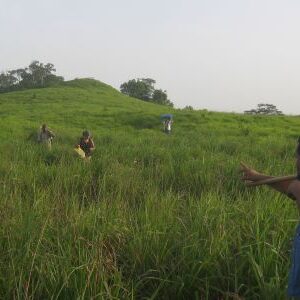2024 Belize: Aguacate
Closed
May 13-June 9, 2024
Archaeology
Dr. John Morris & Mr. Eric Fries
$4,355
April 5, 2024
April 13, 2024 at 10:30am Pacific Time
8 Semester Credits
Program Closed
OVERVIEW
The Aguacate Regional Archaeology Project investigates a series of ancient Maya minor centers and their surrounding settlements. The sites are spread across a series of escarpments at the edge of the Yalbac Hills in western Belize. The region features an unusually high density of small, monumental sites, with a wide range of structures from elite residences, temples and ball courts to formal plazuela groups and individual house mounds. Current models of ancient Maya settlement distribution are insufficient to explain the density and extent of Maya populations revealed by recent advances in remote sensing. Particularly striking are examples of extensive house mounds and architectural remains located in regions at a distance from major centers. The wide variety of site and feature types in the project area allows us to provide training across the whole range of fundamental archaeological field skills. Students will gain experience in both regional and site survey methods, test excavations, exposure of structures, and the identification, recovery and processing of a wide variety of artifact types. Over the course of the program, students will become familiar with several phases of executing an archaeological field project, from establishing the research question, through data recovery and the initial phases of analysis.
instructors
All field school directors are experts in their field and passionate about their work. To discuss the suitability of this program for your career goals – whether within or outside academia – you are invited to contact the directors directly. For a broader discussion which CFS program to choose, you are welcome to contact our staff directly – you can do that through our “Contact Us” page.
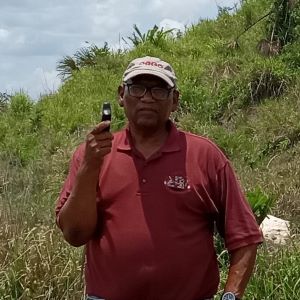

Dr. John Morris
Belize Antiquities Authority
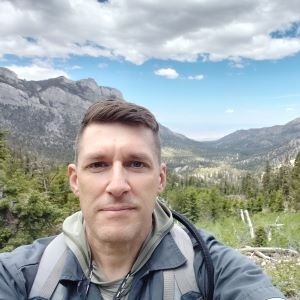

Mr. Eric Fries
University of Nevada Las Vegas
Testimonials
This is a new program, no testimonials are available
student fees (tuition)
what is covered
-
DEPOSIT IS PART OF TOTAL TUITION COST
-
Costs of Instruction
-
Cost of Room & Board
-
Cost of Academic Credit Units
-
Health and Evacuation Insurance
read before you pay
- Application: You must apply online for this program – application is free
- Deposit: A $300 nonrefundable deposit (part of the total tuition cost) is required to secure a space in the program
- Credit Card Fee: Payments with credits cards incur 2.5% processing fee
- Late Fee: A $100 Late Fee will be added to the program costs if tuition is not paid in full by payment deadline
- Cancelation Policy: Carefully read our Cancelation Policy before committing to attend our programs
- Trip cancellation Insurance: Trip cancellation insurance is not provided by CFS. Such policies have changed due to Covid 19. If you wish to purchase an insurance policy that covers pandemic contingencies, explore Cancel for Any Reason (CFAR) plans. Insuremytrip or Travel Guard are possible websites where you may explore different insurance policies
Accommodations
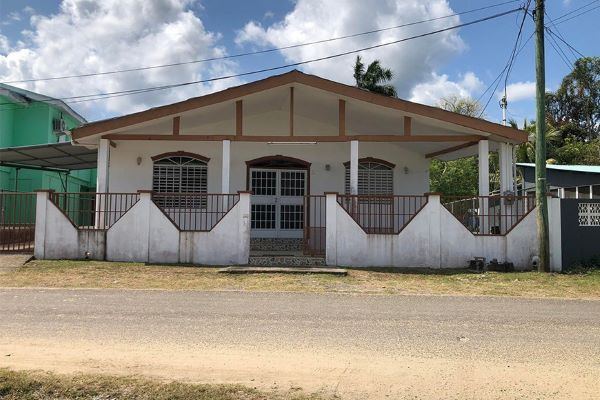

Students will stay at a residence in central Belmopan, the capital city of Belize. The field house is located close to the central ring road, within walking distance to the market and several shops. Students will bunk two to a room. The house has a seating area, kitchen/dining area with refrigerator, and outdoor space which will also be used for artifact processing. Furniture, mattresses, electric fans, and housewares will be provided. The house will not have internet access or television, but internet cafes are available within walking distance.
diet


Breakfast, lunch and dinner will be provided on field days (M-F) and field trip days (some Saturdays). Students are responsible for their meals on non-field trip Saturdays and all Sundays.
Breakfast and lunch will consist of prepared foods from local vendors, e.g. breakfast burritos, rice and beans with fried chicken, sandwiches with French fries and salad. Dinner will consist of cooked meals provided by a local in-house cook. The local staples are rice and beans, chicken, and tortillas, but a wide variety of foods are available, and dinners will vary. Tap water is not potable in Belize. The field house will have a supply of 5-gallon water jugs and a dispenser. Staff will ensure that there is plenty of drinking water available at all times.
travel information
We suggest you hold purchasing airline tickets until six (6) weeks before the program begins. Natural disasters, political changes, weather conditions & a range of other factors may require the cancelation this field school. CFS typically makes a final Go/No Go decision about six weeks before the field school begins. To protect students from potential financial loss, we urge students to purchase airline tickets only six weeks prior to program beginning.
Arrive in Belize International Airport (BZE) on May 13, 2024. The airport is served by United, American and Southwest (Saturdays only). There are two arrival windows for international flights – one around 11am and one around 2pm. Project staff members will wait for students at each of these two windows just outside the arrival hall. Look for staff members holding a sign marked “ARAP”. The airport is very small, so it is basically impossible to get lost or go to the wrong place.
visa information


Tourists entering Belize from the US do not require a visa. Your passport will be stamped with admission good for 30 days. If you plan to remain in Belize or travel regionally after the end of the field school, please contact project staff for advice on how to extend your visa.
Meeting Point
| Date | Time | Location |
|---|---|---|
| May 13, 2024 | 11am & 2pm | Outside the arrival hall, look for staff member holding a sign marked “ARAP”. |
Safety
Our primary concern is with education. Traveling and conducting field work involves risk. Students interested in participating in our programs must weigh whether the potential risk is worth the value of education provided. While risk is inherent in everything we do, we do not take risk lightly. We engage in intensive review of each field school location prior to approval. Once a program is accepted, we review and monitor each program annually to make sure it complies with all our standards and policies, including student safety.
Students attending our international programs are covered by a comprehensive Health Insurance policy that includes physical illness or injury, mental or chronic conditions. There are no deductible and 100% of costs are covered up to $250,000. In addition, we provide Political & Natural Disaster Evacuation policy, which allow us to remove students from program location if conditions change.
Students attending our domestic programs (within the US) must have their own health insurance and provide proof upon enrollment. Program directors are familiar with local authorities and if in need of evacuation, local emergency services and/or law enforcement will be notified and activated.
We have an explicit and robust harassments & discriminations policies. If students feel they cannot discuss personal safety issues with program staff, they are welcome to call the CFS emergency hotline and talk directly with CFS staff members.
Call (+1 562 584-0761) or email (info@fieldsciences.org) if you have questions about the safety of any program.

